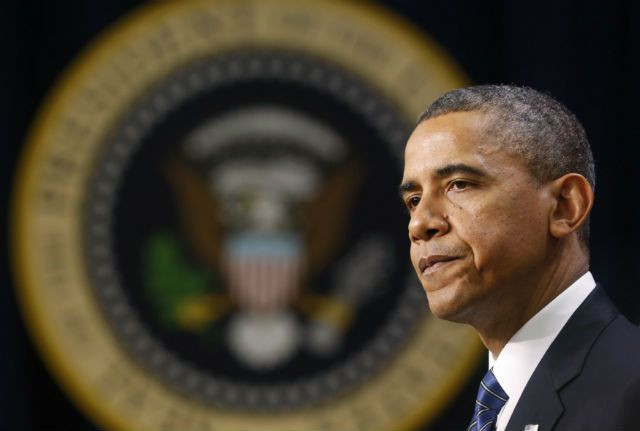
President Barack Obama, who has tried to limit the influence of money in politics, is relying on federal contractors and businesses that profited from his campaign to pay as much as $1 million for his inauguration party later this month.
The fundraising strategy marks a shift from Obama's 2009 inauguration, when he banned corporate money and limited individual contributions to showcase his commitment to transparency and clean government.
This time around, organizers are soliciting bigger checks to pay for a party that will lack the historic aura of 2009, when Obama became the nation's first black president.
Donors include prominent government contractors such as AT&T and Microsoft and a business that sells inauguration merchandise. Wealthy individuals who funded attacks on his Republican rival, Mitt Romney, also appear to be contributors.
Inauguration organizers say the loosened restrictions will make it easier to cover the event's costs after the most expensive election in U.S. history. Organizers are reluctant to rely on individual donors who may feel tapped out after contributing a record $715 million to Obama's re-election.
"We just came off of a very expensive election. We just want to make sure we are meeting the goals we need to in order to put on these civic events," said an official with the PresidentialInaugural Committee, who spoke on condition of anonymity.
Government watchdogs say the fundraising effort highlights the gulf between Obama's rhetoric and his actions in trying to limit the influence of big donors in Washington.
"We have gotten used to being disappointed by him when it comes to money in politics," said Campaign Legal Center policy director Meredith McGehee.
UNEASY RELATIONSHIP WITH BIG MONEY
Since emerging on the national stage in 2004, Obama has struggled to reconcile his desire to rein in political spending with the need to win elections and court allies.
He has called for a constitutional amendment to overturn a 2010 Supreme Court decision that allowed corporations and other groups to spend unlimited funds to influence elections.
Obama initially criticized the "Super PACs," or political action committees, that were set up to take advantage of the court's decision. But he reversed course after it became clear that Republican candidates were benefiting from the new groups and possibly putting Obama's Democrats at a fundraising disadvantage.
Organizers of the Democratic National Convention in Charlotte, North Carolina, in early September initially banned corporate contributions for that event, but eased that restriction when fundraising lagged.
When Obama took office in 2009, inauguration organizers banned corporate contributions and limited individual contributions to $50,000.
This time, organizers say they are reluctant to ask tapped-out campaign contributors to pay for a party that most of them won't attend.
The inaugural committee is asking businesses to contribute up to $1 million - more than the $250,000 limit that Republican President George W. Bush, Obama's predecessor, put in place for his second inauguration in 2005.
Organizers won't reveal the projected cost for Obama's event this year but it is likely to be less than the $53 million bill from 2009, which drew nearly 2 million people to Washington for a star-studded concert at the Lincoln Memorial, a parade and 10 official balls, along with countless private parties.
The 2013 event will have no concert and only two official balls. Top-dollar donors, however, still will have plenty of opportunities for celebration.
Individuals who give $250,000 or businesses that donate $1 million will get tickets to an intimate reception several days before the January 21 swearing-in ceremony and a VIP "candle light celebration" on the evening before, along with prime seats for the parade.
The Inaugural Committee has revealed the names of more than 400 donors. But unlike 2009, the group will not disclose the contribution amounts until after the inauguration, as required by federal law.
"It's a big step back in terms of transparency," said Kathy Kiely, managing director at the Sunlight Foundation, which promotes openness in government.
Among those listed are telecommunications giant AT&T and software maker Microsoft Corp, both of which have a heavy presence in Washington.
AT&T collected $747 million in federal contracts in the 2011 fiscal year, according to figures compiled by the Center for Effective Government, while Microsoft billed $160 million for government work. Both companies contributed more than $1 million to the Democratic and Republican conventions last year.
AT&T and Microsoft declined to comment.
Rhode Island-based Financial Innovations, another donor, sold T-shirts and other official merchandise for Obama's re-election campaign and is now selling inauguration-related souvenirs. The company did not return a call seeking comment.
St. Louis-based health insurer Centene Corp also is listed as a donor.
The company's stock price rose nearly 10 percent after the election, as investors bet that the health insurer would benefit from Obama's healthcare overhaul. The company did not respond to a request for comment.
Biotech firm Genentech said it is "proud to provide support for the presidential inauguration," but declined to say how much it had donated.
Inauguration donors appear to include individuals who contributed heavily to Obama's re-election effort, though it is difficult to know for sure given the few details released by the committee.
California biotech executive Paul Zygielbaum appears to have donated roughly $270,000 to Democrats during the past two years, and Marsha Laufer is married to a hedge-fund executive who donated $1.5 million to Priorities USA Action, a Super PAC allied with Obama.
Neither responded to a request for comment.
Several individual donors appear to be employees at Bully Pulpit Interactive, a company that handled digital advertising for the 2009 inaugural and Obama's re-election. They did not respond to requests for comment.
© Thomson Reuters.




